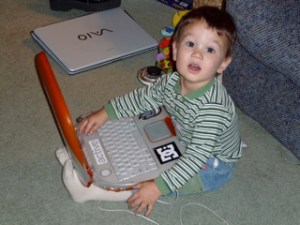 Samuel is a communicator. In the months leading up to his 2nd birthday, he started using sign language extensively to let us know many of his needs and wants. Baby sign language, where parents teach a baby signs so that he can communicate before he is able to talk, is a growing trend right now, but that's not what we were dealing with.
Samuel is a communicator. In the months leading up to his 2nd birthday, he started using sign language extensively to let us know many of his needs and wants. Baby sign language, where parents teach a baby signs so that he can communicate before he is able to talk, is a growing trend right now, but that's not what we were dealing with.When Samuel started to eat at the table with us, I tried to teach him the sign for "more," just to make our mealtimes peaceful, but he didn't seem to catch on, and I gave up. Then one day about a month later, Samuel finished his food and sat quietly signing "more" until George noticed. We were impressed, and we were even more impressed when he began to use the sign for "all done," which we had taught him inadvertently by putting our hands out to the sides when we would ask him if he was "all done." These two signs greatly simplified our lives, letting us know if Samuel was hungry or full, and we were so happy that he was using them.
But before long we began to notice other signs. There was "telephone," an open hand held over his ear, "chapstick," signed by tracing his lips with his index finger and thumb held together, and "hairbrush," indicated by stroking the top of his head. Every week or so he would create new signs, using them consistently until we figured out what they meant. We learned that tapping his chest meant "bib," knocking on the table meant "egg," and moving the tip of his tongue back and forth between parted lips meant "toothbrush." There were a few signs that we never did figure out, but I suppose that was due to a lack of imagination on our part, rather than a lapse of intelligence on his.
Now, at 25 months of age, he is talking more and more and abandoning the use of signs, but even with speech, he prefers to make up his own language. So bits is pants, and ditz means "music"–and "egg" and "clap" and perhaps "hand," depending on the context. (We think the word ditz originally evolved from the word dance, which is something he loves to do to music. However, he understands the word music when we use it; he simply refuses to use it himself.) Juice means both "juice" (or any liquid, for that matter) and "shoes." I admit that these words sound similar enough that a 2-year-old may be excused for pronouncing them alike. But what about using deedee for "kitty" and "guitar"? In this instance, Samuel's language seems to be tonal, as deedee for "kitty" has a rising then falling intonation, whereas deedee for "guitar" is flat.
As with signing, his strategy with speech is to use his chosen word consistently until we learn what it means. His newest one is nerny, which we're still trying to figure out. When pronounced in a whining tone, it seems to mean "an item of food on my plate that I don't want" (as in the sliver of bell pepper on his slice of pizza the other night), but when said with excitement, I think it means "an item of food, not currently in my possession, that I want" (as in the cucumber that I was slicing for a salad the other day).
Sometimes we get so absorbed in trying to understand his unique language that we even start to use his vocabulary. I was taken aback one day to hear George say, "Samuel, do you want to go juice on the potty?" How is the child ever going to learn how to communicate if we speak like him? Oh, that's right–he has no trouble communicating, and if English proves to be too much trouble for him, he can always go back to signing. Though he relies mostly on speech now, just last week he added a new sign. Whenever he hears a piano playing, he reaches forward with one hand and wiggles his fingers.
UPDATE, August 18, 2012: Eventually we figured out that nerny meant a fruit or vegetable. And here's another bizarre word from Samuel's 2-Year-Oldese: for many, many months, dub-duh meant "pizza."
If you enjoyed this, please consider subscribing here. I would be honored to have the privilege of encouraging you on a regular basis!
